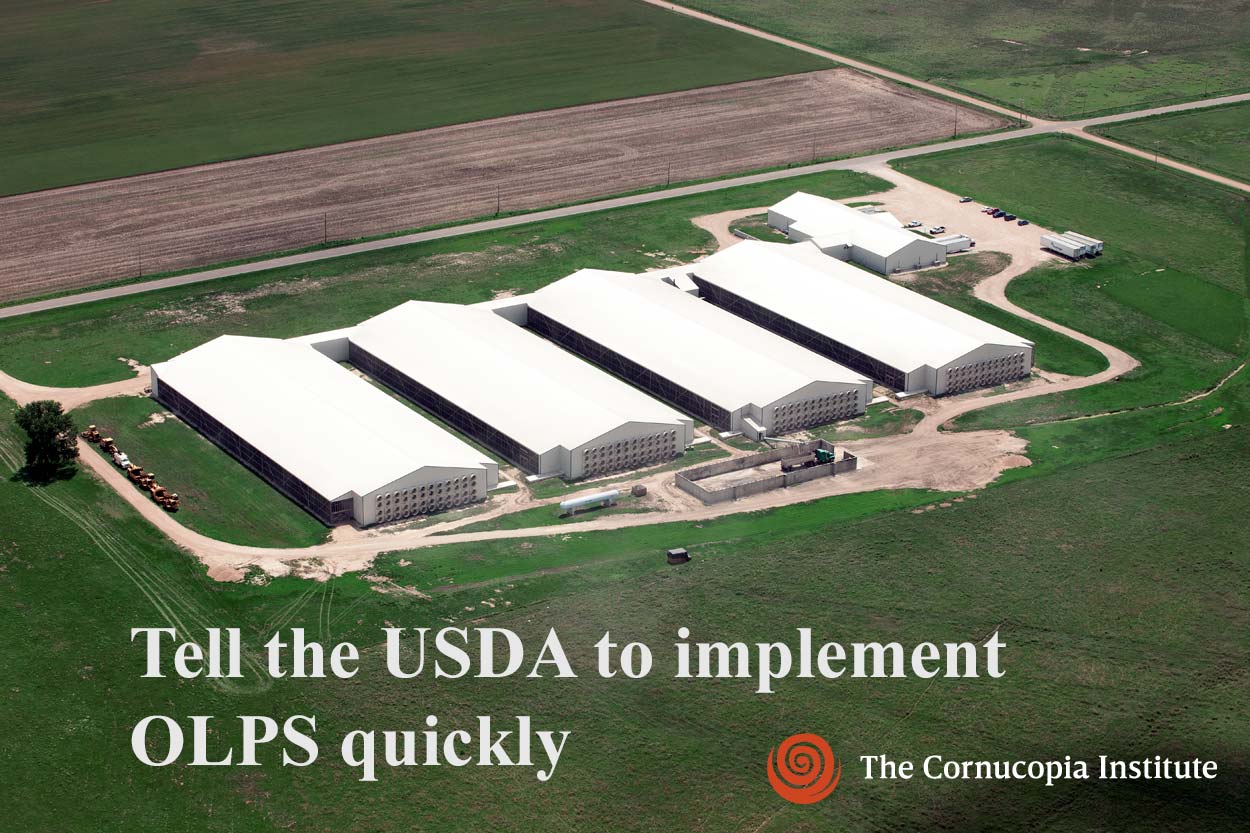UPDATE: Deadline to comment extended to November 10
The deadline for OLPS comments has been extended to November 10. While this allows more time for consumer and retailer support, industry will take full advantage of this opportunity. Your comment is more important than ever!
The unparalleled importance of the Organic Livestock and Poultry Standards rule
The recently proposed Organic Livestock and Poultry Standards (OLPS) rule is one of the most important attempts at regulation in the last 20 years.
“Any effort to reject this rule is a gift to industrial operators,” says Cornucopia Executive Director Melody Morrell.
OLPS would enshrine animal welfare in organic regulation by phasing out the allowance of screened porches as the only outdoor access for birds. Conventional agriculture interests oppose this regulation and are working closely to influence lawmakers in their states, many of whom are more concerned with industry profits than organic integrity. Opposition from elected representatives could stop any rule meant to improve organic animal welfare.
It is unlikely we will get another chance to ensure that animal welfare improves under the organic label.
A previous rulemaking, called Organic Livestock and Poultry Practices (OLPP), was finalized at the end of the Obama administration. Over 40,000 comments from a diverse group of stakeholders favored its implementation.
The incoming Trump administration delayed the OLPP multiple times, despite pleas from farmers, consumers, and other stakeholders to enact it quickly. Ultimately, USDA withdrew the OLPP entirely in March 2018, ignoring public comments.
How we got here
In 2002 a certifying agent rightly denied certification to Country Hen, determining that the egg operation’s porches, which lacked any view of open sky or access to the ground, did not amount to “outdoor access” for birds. (The USDA initially agreed with the certifier.)
Country Hen appealed the decision, winning in administrative court. The Agricultural Marketing Service judge found that poultry porches could be allowed because the organic rules did not specify outdoor space requirements or conditions for organic poultry (only that they must have “access to the outdoors”). The court directed the certifier to grant organic certification, establishing a dangerously powerful legal precedent.
Organic activists have been calling for clarifying regulation for 20 years and organic integrity has suffered. USDA’s molasses efforts to shore up these known loopholes in the organic law have allowed industrial organic operations to outpace and undercut authentic organic production.
Cornucopia conservatively estimates that more than half of the organic eggs in the market come from industrial operations using porches.
Now is the time for a united front
Cornucopia stands with consumers and authentic organic farmers in seeking a more level playing field. “Organic farmer-members of Organic Farmers Association voted to support the final OLPP rule in 2018, so we have been supportive of these animal welfare standards for years,” says Kate Mendenhall, Executive Director of the Organic Farmers Association.
She explains, “We’ve been waiting for the USDA to codify the proposed animal welfare regulations for over a decade and, in the meantime, organic farmers who are meeting consumers’ expectations for what organic means have been competing at an economic disadvantage in the marketplace.”
A market we can trust?
As the distance between authentic organic and industrial organic widens, market failure is a real concern. An unprecedented show of unified support for speedy implementation of livestock improvements indicates the gravity of this situation.
Cornucopia has joined many nonprofits, including several animal welfare groups, in signing a letter by the Organic Trade Association (OTA) to USDA Secretary Vilsack in support of OLPS. This extraordinary moment of collaboration is required to push the USDA to phase out chicken porches and pass other animal welfare improvements.
“It would set the legal precedent that continuous improvement is part of the organic regulations.” That’s the firm determination of Cornucopia Policy Director Kestrel Burcham, JD, who has thoroughly and independently examined the language in this rule.
The USDA needs know that consumers want better animal welfare and are willing to pay for it.
“We need animal welfare improvements immediately,” says Cornucopia Board President and organic broiler producer Cameron Molberg. “This rule has been 20 years in the making, and we can’t afford to miss this opportunity.”
Prompt public participation – from consumers, from farmers, and from businesses – is vital. Check out Cornucopia’s Action Alert with instruction on how to comment. Retailers, read our summary of how you can help and why this matters. Farmers and other interested parties should sign the Organic Farmers Association petition to the USDA.


